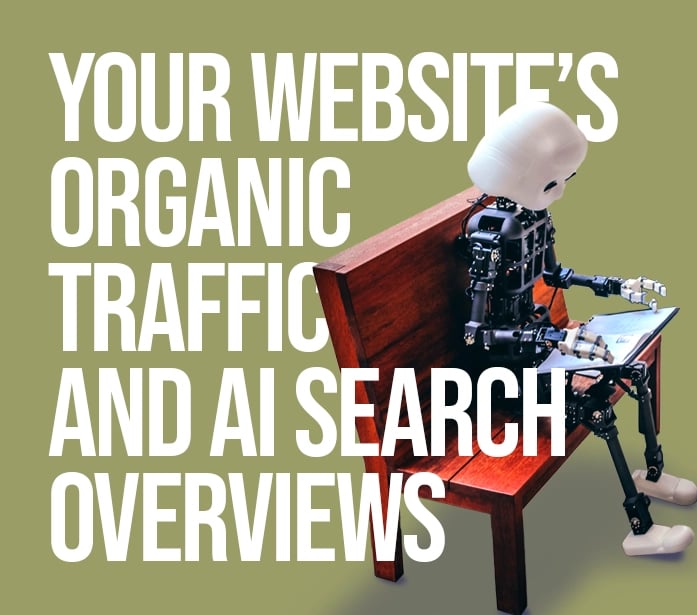Has Your Website’s Organic Traffic Been Affected by AI Search Overviews?
WEBSITE OPTIMIZATION
Mike Tapia
7/11/20255 min read


Search engine optimization (SEO) used to be about ranking in the top 10. Now, with AI-generated search summaries sitting above the results, being number one might not even get you the click. If you’ve noticed your organic traffic quietly slipping over the past few months and can’t pinpoint the usual culprits—algorithm updates, broken links, bad content—AI might be the invisible hand stealing your clicks.
As a digital marketer and a web admin, I’ve seen firsthand how quickly a well-optimized site can go from a traffic machine to a ghost town—all without breaking a single SEO rule. The culprit? A growing trend in search: AI search overviews.
In this post, I’ll walk you through exactly how AI search overviews impact website traffic, why it matters to your business, and what you can do to get ahead of this shift before your competition does.
In This Article
What Are AI Search Overviews?
AI search overviews—like Google’s AI Overviews or Bing’s Copilot summaries—use artificial intelligence to scan the top-ranking web content and generate a synthesized answer directly in the search results. These summaries often appear above traditional organic listings, in a spot once reserved for featured snippets or knowledge panels.
In short: searchers now get answers without clicking anything.
These overviews are presented as helpful, instant explanations, sometimes even listing sources (but not always in a prominent way). The goal? Reduce friction for users and keep them inside the search engine ecosystem longer.
But for marketers and business owners relying on SEO to generate traffic, that creates a serious problem.
AI Isn’t Just Analyzing Content
Let me share a quick story. One of my clients runs a B2B SaaS platform with a healthy blog that pulls in thousands of monthly visitors through longtail content. Around February 2024, we saw an unexplained drop in traffic—about 18%—across top-performing informational posts. No algorithm update. No competitor out-ranking us. Everything looked normal… until I searched for a few of the blog topics myself.
The top result? A Google AI Overview summarizing the entire blog post, complete with bullet points and a cheerful AI-generated answer. Our content was being used—accurately—but without a single click back to the site.
That’s when it became clear: AI wasn’t just analyzing content. It was replacing the need for users to visit the site at all.
How AI Search Overviews Impact Website Traffic
We’re not alone. Several SEO platforms and industry analysts have started tracking how AI summaries are shifting user behavior in search.
Similarweb and SparkToro reported that zero-click searches now make up over 65% of Google queries—a number that’s only rising with AI Overviews.
SEO toolset providers like SEMrush and Ahrefs have noted an average 10–20% dip in organic traffic for informational queries.
Certain sectors—especially healthcare, finance, software, and consumer products—are hit the hardest, where direct answers are easiest to summarize.
So yes, AI search overviews are impacting traffic—and not just a little.
Why This Matters to Your Business
Whether you’re running a local bakery or a B2B SaaS startup, if SEO is part of your lead gen strategy, AI summaries are now an invisible competitor.
For B2C Brands:
If you’re relying on blog posts like “How to Choose the Best Moisturizer for Dry Skin” or “Top 5 Exercises for Lower Back Pain,” chances are AI is already answering that without sending readers to your site. This impacts product awareness, affiliate traffic, and your authority in the space.
For B2B Marketers:
Your thought leadership articles—those long-form, well-researched pieces meant to drive trust and leads—may now get quoted by AI instead of clicked on. That weakens your funnel, reduces email sign-ups, and leaves your brand invisible.
For Small Business Owners:
Even locally focused content like “Best time to prune oak trees in [City]” can be eaten up by AI Overviews, making your site less relevant—even if you’re the local expert.
How AI Search Overviews Choose Content
Understanding how these overviews work can give you a leg up. AI search summaries don’t pull from just one source—they aggregate and summarize from the top results.
Factors that increase the likelihood your content is used in AI overviews:
Strong topical authority (a history of covering the subject)
Structured content (clear headings, lists, and Q&A format)
E-E-A-T principles (Experience, Expertise, Authoritativeness, Trustworthiness)
Schema markup that helps Google interpret your content better
But even if you’re featured, users may not click through—because the answer they need is already right there.
How to Adapt Your SEO and Content Strategy
So what do you do? Give up on SEO? Of course not. But you do need to evolve your approach.
1. Optimize for “Answer-Like” Formatting
Write content that’s easily surfaced in AI overviews:
Use question-based headings (“What is X?”, “How does Y work?”)
Provide direct answers in the first few sentences
Follow up with deeper content AI can’t easily summarize
This helps your site become a preferred source—and potentially earns backlinks when other sites cite the overview.
2. Build Out Content That’s Hard to Summarize
Go beyond surface-level answers:
Include unique data, case studies, charts, or infographics
Provide real-world examples and narratives (AI often avoids subjective content)
Add expert quotes or first-person insight
Think: what would a robot struggle to paraphrase?
3. Strengthen Your On-Site UX and Conversion Funnels
When visitors do land on your site, make it count.
Optimize your layout for clarity and engagement
Add internal links and clear CTAs
Use tools like exit-intent popups or lead magnets to capture value even from fewer visitors
4. Diversify Beyond Google
Organic traffic is just one channel. Double down on:
Email marketing — build a direct relationship with your audience
Social media content distribution
YouTube or TikTok, where AI overviews aren’t cannibalizing traffic (yet)
Podcasting and webinars — formats AI can’t easily scrape or replicate
Emphasize Branding: Your Moat in an AI World
Here’s the hard truth: In an AI-driven SERP, brand recognition becomes your biggest advantage.
When someone searches for a topic and sees your brand name—even in an AI Overview—they’re more likely to click it if they already trust you.
That means:
Keep showing up with value
Invest in reputation-building (PR, social proof, reviews)
Make your voice memorable and distinct
The future is less about ranking #1 and more about being recognized when you do show up.
The Future of Search: What to Expect in the Next 12 Months
AI search overviews are only getting smarter. Expect to see:
More multimedia AI answers (images, videos, audio)
Less visibility for non-branded content
Paid placements within AI answers (yep, sponsored summaries and product suggestions are coming)
Search isn’t dying—but it is evolving. Quickly.
Key Takeaways
AI search overviews are reducing organic website traffic by providing instant, zero-click answers directly in search results—often using your content without driving visits.
Industries relying on informational content (like B2B, SaaS, and B2C consumer guides) are especially vulnerable to traffic loss as AI tools summarize their insights.
Content that ranks in AI overviews typically follows clear structures, includes direct answers, and demonstrates expertise through E-E-A-T principles and schema markup.
To adapt, marketers must create deeper, harder-to-summarize content, strengthen their brand recognition, and diversify beyond Google by investing in email, video, and social.
The future of SEO lies in visibility and brand authority, not just ranking—businesses that evolve now will be best positioned as AI search continues to grow.
Conclusion
So, how do AI search overviews impact website traffic? In short: they siphon visibility, reduce clicks, and force marketers to adapt fast.
But there’s good news. If you understand the shift—and take action—you’ll be ahead of the competition who are still optimizing for the “old” search.
I’ve helped businesses weather algorithm storms, adapt to zero-click searches, and now—pivot for AI-driven SERPs. It’s not the end of SEO. It’s just a smarter phase.
Ready to Future-Proof Your Website?
If you’re seeing unexplained traffic drops, don’t ignore them. Now is the time to reassess your SEO and content strategy with AI in mind.
✅ Run a content audit
✅ Optimize for AI visibility and conversions
✅ Double down on what AI can’t replicate: your story, your data, your brand
Want help? Let’s chat. I offer website audits and strategic consultations tailored for this new AI-first era.
©2026 All Rights Reserved - Mike Tapia Studios LLC - Cookie Policy - Privacy Policy - Terms & Conditions


